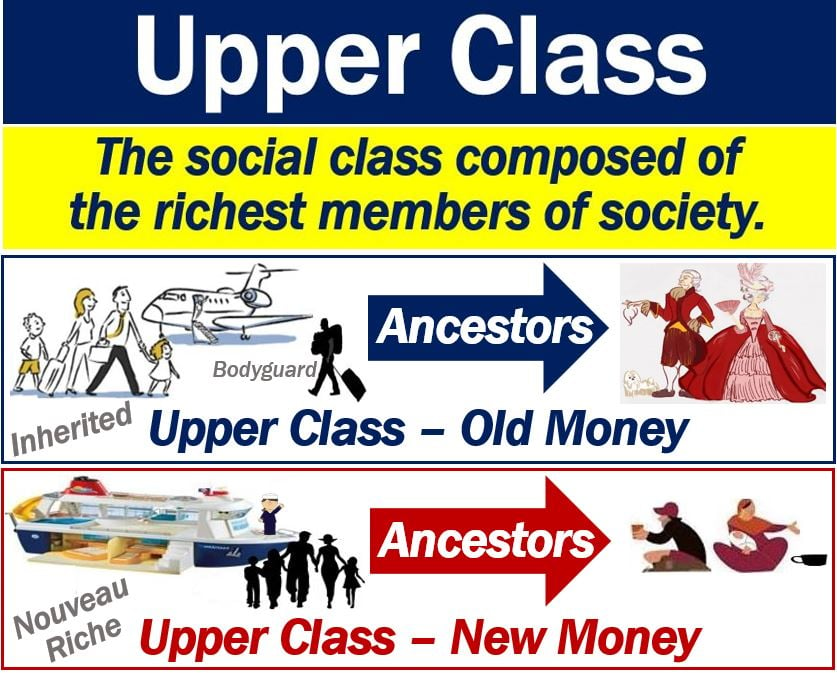What is upper class? Definition and examples
The Upper Class refers to the richest people in society. We distinguish it from the middle class and working class. The upper class represents a tiny proportion of the population. However, it owns and controls a disproportionate amount of the country’s wealth, i.e., up to two-thirds of it.
People in this class enjoy the highest status in society. In the past, the aristocracy belonged to this group.
The Cambridge Dictionary has the following definition of the term:
“[The upper class is] a social group consisting of the people who have the highest social rank and who are usually rich.”
Apart from being the wealthiest people in society, people in this class also wield the greatest political power.
It consists of individuals who inherited their wealth and those who started off in the middle or working class.

Upper class – United States
In the United States, this class consists of people at the top of the socioeconomic ladder.
Compared to the UK, wealth is the main determinant of this class in the US.
However, there are still many Americans today who say America’s true upper class are those belonging to ‘old money.’
Old money refers to families that have inherited their wealth. These families have been wealthy for generations. Old money contrasts with new money or nouveau rich.
America’s upper class represent just one or two percent of the country’s population. However, the richest one percent owned 35% of the country’s wealth in 2007.
Since the Great Recession, estimates have varied. However, they all agree that the top 1% share of America’s wealth pie has grown since 2007.
Upper class in the UK
In some societies, no amount of new money can make you upper class. If you were not born in that class, you will never belong to it. In those societies, which schools you went to also matter.
Many people in the United Kingdom (UK) think this way. In fact, several rich British modern musicians say they are still working or middle class.
In these societies, if you were not raised in a certain way you are not upper class. Also, you must have the posh accent.
In the past, in the UK, the traditional upper class consisted of the landed gentry and the aristocracy. These were privileged families who had inherited their wealth and typically had hereditary titles.
Most post-medieval aristocratic families in Britain originated in the merchant class. They became nobles between the fourteenth and nineteenth centuries.
Since World War II, however, the term’s meaning has gradually evolved. The upper class today in the UK also includes wealthy business people.
Social mobility, the ability of individuals or families to move between social classes, is often more restricted for those trying to ascend into the upper class due to the entrenched advantages held by those born into wealth and status.
Inequality
Inequality is the difference between the upper, middle, and working classes regarding their wealth or incomes. We also call it economic inequality.
Wealth inequality looks at how much people own.
Income inequality, on the other hand, looks at the difference in people’s monthly or annual income.
Inequality has been increasing in the advanced economies since the 1980s. In other words, the richest people’s wealth is growing faster than the wealth of the middle and working classes.
Compound Phrases with “Upper Class”
There are several compound phrases in the English language containing the words “upper class.” Let’s have a look at some of them:
-
Upper-Class Affluence
The state of having a great deal of money and resources, typical of the upper class.
Example: “Upper-class affluence is often evident in the exclusivity of gated communities.”
-
Upper-Class Mores
The set of traditional customs and behaviors of the upper class.
Example: “The novel provides a detailed description of the upper-class mores of the early 20th century.”
-
Upper-Class Etiquette
The code of polite behavior among members of the upper class.
Example: “At the gala, guests were expected to adhere to upper-class etiquette.”
-
Upper-Class Lifestyle
The way of living that reflects the high socioeconomic status of the upper class.
Example: “The magazine featured articles on the upper-class lifestyle, including luxury travel and fine dining.”
-
Upper-Class Privilege
The advantages inherent to members of the upper class by virtue of their status.
Example: “The debate intensified over upper-class privilege and its impact on social equality.”
-
Upper-Class Twit
A derogatory term for a person of high social status perceived as foolish or silly. The term satirically highlights a stereotype, suggesting that wealth and status do not necessarily imply wisdom or common sense.
Example: “The comedy sketch portrayed the character as an upper-class twit, completely oblivious to everyday challenges.”
2 Videos
These thre educational videos featured on our partner YouTube channel, Marketing Business Network, explain the meanings of ‘Upper Class’ and ‘Inequality’ utilizing easy-to-understand language and real-world illustrations.
-
What is (the) Upper Class?
-
What is Inequality?

